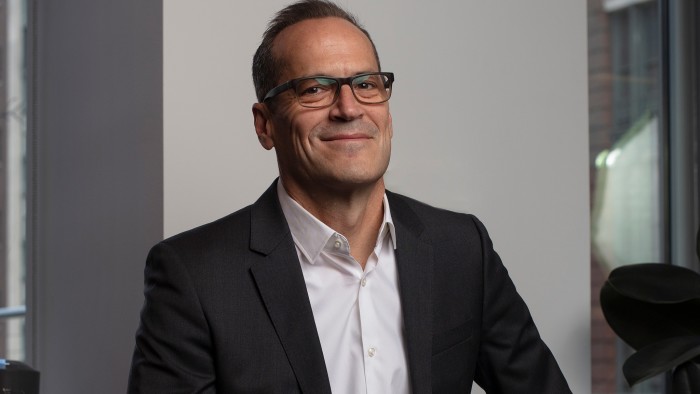Business schools wake up and smell the (ESG) coffee

Roula Khalaf, Editor of the FT, selects her favourite stories in this weekly newsletter.
By taking a commodity and turning it into a luxury product, Nespresso has generated billions in sales from its coffee pods. Boosted by the endorsement in its adverts of actor George Clooney, the company, owned by Swiss multinational Nestlé, has an annual turnover of SFr5.9bn ($6.3bn).
However, Nespresso has come under heavy criticism over the environmental impact of the aluminium pods that end up in landfill, because the metal is not biodegradable. It can be recycled, though.
Nespresso turned to NYU Stern School of Business in New York to create a custom executive course, run most years since 2016, to help employees understand coffee sustainability. There have been 118 participants, from different levels of the company, and what they have learnt has already helped it improve recycling rates.
FT Executive Education directories 2021

View a list of customised programme providers and open courses for managers in our directories.
Plus read more executive education coverage at www.ft.com/execed and find out what the listings show.
Attendees visit a coffee farm in Costa Rica to understand the company’s sustainable sourcing programme, set up in 2003 with the Rainforest Alliance, an environmental organisation. They also take business classes, learning about brand storytelling to court consumers, and are encouraged to develop proposals for projects on the course — for example, ways to reduce waste in Nespresso’s offices.
“Visiting the farm is an eye-opening, emotional experience that gives employees a context and appreciation for what they do,” says Alfonso Gonzalez Loeschen, chief executive of Nespresso North America. “They now see the business through a different lens, looking not just at the financials but the social and environmental impact of their decisions, too. They challenge the way we do business.”

The participants, mostly in customer-facing roles, have helped boost participation in Nespresso’s US recycling programme with delivery company UPS, encouraging consumers to mail back used pods at 88,000 drop-off points across the country. Nespresso staff also introduced customers to products forged from recycled pods, including an edition of the Victorinox Swiss army knife. This helped raise the US pod recycling rate from 17 per cent to 32 per cent between 2016 and 2020; the global rate is 30 per cent.
Loeschen is not alone: executives in companies around the world are under increasing pressure to address social, environmental and ethical problems. The Covid-19 pandemic has fuelled the debate about the purpose of a company and has led some to enlist the help of business schools to build more inclusive business models.
In the wake of the 2008 financial crisis, some critics labelled business schools “academies of the apocalypse”, arguing that they were partly culpable. Many institutions, however, are moving beyond the shareholder-primacy model and emphasising the longer-term interests of employees and broader society in their executive education programmes, encouraging organisations to become better corporate citizens.
This month, UC Berkeley Executive Education in the US and Aalto University Executive Education of Finland launch a new course on how to integrate sustainability into a business strategy. Robert Strand, executive director of Haas’s Center for Responsible Business, says the pandemic has put “stakeholder capitalism on steroids”. It has “exposed and worsened inequalities, but it’s also an opportunity to change the narrative of capitalism, and redefine the purpose of a corporation”, he adds.
Academics disagree over whether coronavirus will really reset capitalism, but the appetite is strong for executive courses that go beyond the bottom line. Nicholas Pearce, professor of management and organisations at Northwestern University’s Kellogg School of Management in Illinois, says many executives are interested in using business as a platform for social change. “The pandemic forced people to reflect on their responsibility to use positions of privilege and power to do good,” he says.
Pearce says Kellogg’s corporate clients are increasingly requesting bespoke programmes on social purpose, employee wellbeing, and diversity and inclusion. Likewise, Ioannis Ioannou, associate professor of strategy and entrepreneurship at London Business School, agrees that demand for such training outstrips supply. “Coronavirus has awakened the ‘S’ in ‘ESG’,” he says, reflecting a rethink by companies particularly on social issues alongside environmental and governance factors.
Ioannou launched an online sustainability leadership and corporate responsibility programme at LBS last year, enrolling four times as many executives as he expected. Ione Anderson, a non-profit executive, and serial entrepreneur Ricardo Assumpção met on the course last year. They both enrolled in response to the pandemic and were inspired to launch Grape ESG — a sustainability consultancy in Brazil — shortly after graduation.
The pair say they have won clients using knowledge from the course, including the strong business case for ESG. A 2018 study by Axioma, an analytics company, found that businesses with superior ESG scores reported improved financial performance and outperformed the wider stock market. “The way we sell our services is totally based on what we learnt in business school,” says Assumpção, chief executive at Grape ESG. Alongside this, the programme provided a framework for carrying out a sustainability assessment on a company. “It’s given us a better view of the external pressures and risks companies face,” says Anderson, chief operations officer.
Climate Capital

Where climate change meets business, markets and politics. Explore the FT’s coverage here
Tensie Whelan, director of the Center for Sustainable Business at NYU Stern, says many executives want help navigating the “alphabet soup” of standards used by companies to measure their sustainability efforts. The acquisition of these and other skills represents “the next wave of good management”, she suggests.
Whelan says purpose and profit can go hand in hand. Florian Lüdeke-Freund, professor of corporate sustainability at ESCP Business School in Berlin, agrees, saying schools face a tricky balancing act between teaching social purpose and meeting demand for traditional skills such as finance. “The challenge is to respond to the public perception that we are the bad guys driving profit maximisation, blamed for our role in the 2008 financial crisis — but without alienating clients or being accused of greenwashing,” he says.
While many business schools still encounter resistance to change among corporate clients, Whelan and others stress the importance of their role in undermining claims that sustainability hampers financial performance. “We are debunking myths,” she says.
This article has been amended to reflect that UC Berkeley Executive Education and Aalto University Executive Education jointly launched a course on sustainability and business strategy.
Comments